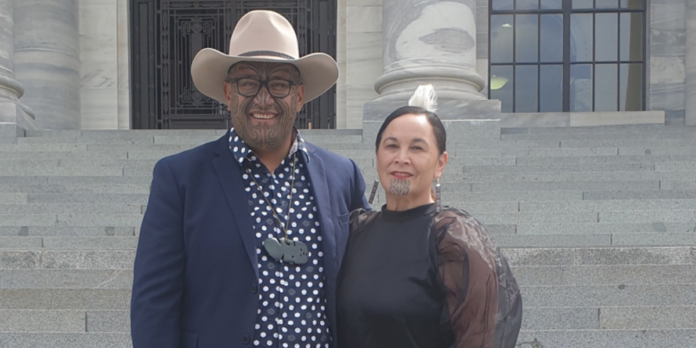With the Māori Party picking up a second MP after the count of the specials, a possible new political alliance opens up for Labour and Māoridom.
Since 1936 with the Rātana-Labour alliance, Māori have worked alongside Labour for a better future. This relationship was damaged when Helen Clark confiscated the foreshore and seabed and that schism birthed the Māori Party.
With a new Māori Party leadership team, the opportunity for a new Labour-Māori Party relationship and political alliance should be considered.
Labour and the Māori Party should negotiate a political alliance whereby Māori Party candidates stand in the Māori electorates, but Labour gets the Party vote.
‘Candidate vote Māori Party, Party Vote Labour’ could be the strategy in the Māori Electorates to maximise Māori Party and Labour Party vote.
Such a maximization would cement into place a Labour-led majority for the next 5 terms of Government.
It is time for such strategic thinking to ensure transformative change.
First published on Waatea News.







“This relationship was damaged when Helen Clark confiscated the foreshore and seabed and that schism birthed the Māori Party.”
Nice try. Auntie Helen didn’t “confiscate” the foreshore and seabed, because iwi/Maori didn’t own them. She merely confirmed that they belong to the whole country. And thank goodness she did – that’s one thing she got right.
PP II: “Auntie Helen didn’t “confiscate” the foreshore and seabed, because iwi/Maori didn’t own them. She merely confirmed that they belong to the whole country.”
Precisely. Martyn does know – or ought to know – the story of the foreshore and seabed controversy, because I told him. And I supplied a link.
Telling a version of the truth – or an outright untruth – isn’t helpful to any cause for which anyone wishes to advocate. If, as a result, advocates have hold of the wrong end of the stick, the solutions they wish to bring about will be the wrong ones.
Just like nobody owns the water aye Pope, bloody bullshit do you thinks us natives are fucken stupid, we are educated nowadays Pope.
covid is pa: “….. nobody owns the water….”
Nobody owns the water anywhere in the world, delusions to the contrary notwithstanding.
You had better be glad of this, here in NZ at present. Were it otherwise, local Maori might well be facing a hefty bill for water damage in Napier.
Such an alliance, between Labour and the Maori Party, could dilute the power of the Maori vote. Like we see with the Greens, despite the campaign promises, the Greens get the wins that Labour is comfortable with. The Greens will not work with anyone else, and Labour knows it.
Would the same happen to the Maori Party if they were to align with Labour? For Labour to only agree to what they are comfortable permitting, and only giving portfolios to the less radical, well behaved Maori Party MPs? Sitting at the table is one thing, being heard and making change is another.
Surely it would be better for Maori voters to see a contest between parties, to have a choice knowing that a vote for the Maori Party can be a vote against Labour, not just an indirect vote for more of the same.
However, if it secures another five terms for Labour, I won’t complain.
DX5: “….an alliance, between Labour and the Maori Party….”
Why would Labour do any such thing? Maori Party support is minuscule: 1.2% at this most recent election.
Maori Party members must face the apparently unpalatable fact that they do not have the electoral support to give the party any negotiating heft at all.
According to the news Jacinda does not want a formal allience with the Maori Party . The hated National Party took them as a partner but Maori still seem to think they are better off under a Labour government despite getting nothing out of the last 3 years that I am aware of. June 2023 will see claims of they are us and gifts promised if Maori give Labour their vote again . Until then nothing just the same way benefituries are treated.
Trevor Sennitt: “….Maori still seem to think they are better off under a Labour government despite getting nothing out of the last 3 years that I am aware of.”
Nothing that I’m aware of, either. And they got nothing out of an arrangement with the Natz except for a collapse in the Maori Party vote.
Maori – at least the political wing as represented by the Maori Party and likely the iwi elites – must accept that they’ll get nothing from either Labour or the Natz. That’s because both parties are irredeemably neoliberal and recognise the perils of identity politics. Identity issues are potential election-losers; voters don’t like policies which either smell of, or bring about, special treatment for particular groups in society.
“….just the same way benefituries are treated.”
The government would be on safer ground, were it to significantly boost benefit levels. Most of the ills that plague a subset of this society stem from poverty. And it’s never the children’s fault.
“…they’ll get nothing from either Labour or the Natz. That’s because both parties are irredeemably neoliberal and recognise the perils of identity politics. ”
Whoa there D’Esterre, that’s a whale of a non-sequitur you’ve got there. Identity politics is perfectly compatible with neoliberalism. Identity politics can in fact be viewed as the handmaiden of neoliberalism, as it’s a wonderfully efficient way of laundering the neoliberal project. For example, Amazon might deflect criticism of their zero-hours contracts by saying “but hey, why aren’t you celebrating how diverse our board of directors is.” Hyper-ambitious individuals promote identity politics in the corporate world as a way of signalling that they’re “part of the solution”, later going on to pay themselves outrageous salaries after they’ve clawed their way to the top. Throw in enough “ngaa mihi” and “kia kaha” and you can get away it – for a while at least.
Jacinda and Robbo understand the short-term political utility of identity politics too, which is why they focus on things like “period poverty”, getting more women onto sporting bodies, and “hate speech” legislation – without addressing any of the country’s fundamental problems.
Check out this critique of contemporary feminism and other identity movements as handmaidens of neoliberalism: Brenner, J., & Fraser, N. (2017). What is progressive neoliberalism?: A debate. Dissent, 64(2), 130-130.
Never say never in politics. But really, after the MP sucking up to National for a decade, as Māori statistics further plummeted, it will take some convincing those that went to Mana that the pro capitalist Iwi elites are no longer in charge of the MP.
Best to sit that one out for another election perhaps.
It’s because your not a liberal Boomer is why I love your comments. This makes a lot of sense, look at where I live, Labour party won both seats on the back of the Māori vote. Imagine if all brown people in this country could actually vote.
PP II: “Identity politics is perfectly compatible with neoliberalism.”
Indeed it is, at least in theory. But in practice, the evidence suggests it’s a vote-loser. People can see through it. And do: they don’t like anything which smells of privilege for particular groups, especially on the basis of ethnicity. We remember this from the time of Don Brash’s Orewa speech. Neo-liberals are well aware of this.
I’m an old lefty. I’m irritated by, and dismissive of, the sort of identity politics you adduce in your comment. In my view, we’ve had more than enough of this nonsense over the last 20 years or so. Governments do it, so as to pretend that they’re actually governing, when they lack the cajoñes to do the actually-needed structural stuff.
Note that the neoliberal Labour and National governments of the 1980s and 90s didn’t faff about with the identity stuff.
Except in the 90s for the Treaty settlements. Which, I think, qualify as identity politics. And by 2004, the voting public had become very uneasy about them.
NZ is a multi-ethnic community: has been since the time of first settlement, in fact. And the scale of immigration over the past 30-ish years has cemented that aspect. There’s no turning away from it.
The current government’s electoral victory was, by the looks of it, driven by fear. And the Labour party vote numbers, in particular in the rural electorates, suggests a determined attempt to keep the Greens – the party of identity politics – governmentally impotent. In which enterprise, the voters have apparently been successful. God bless them all.
Comments are closed.